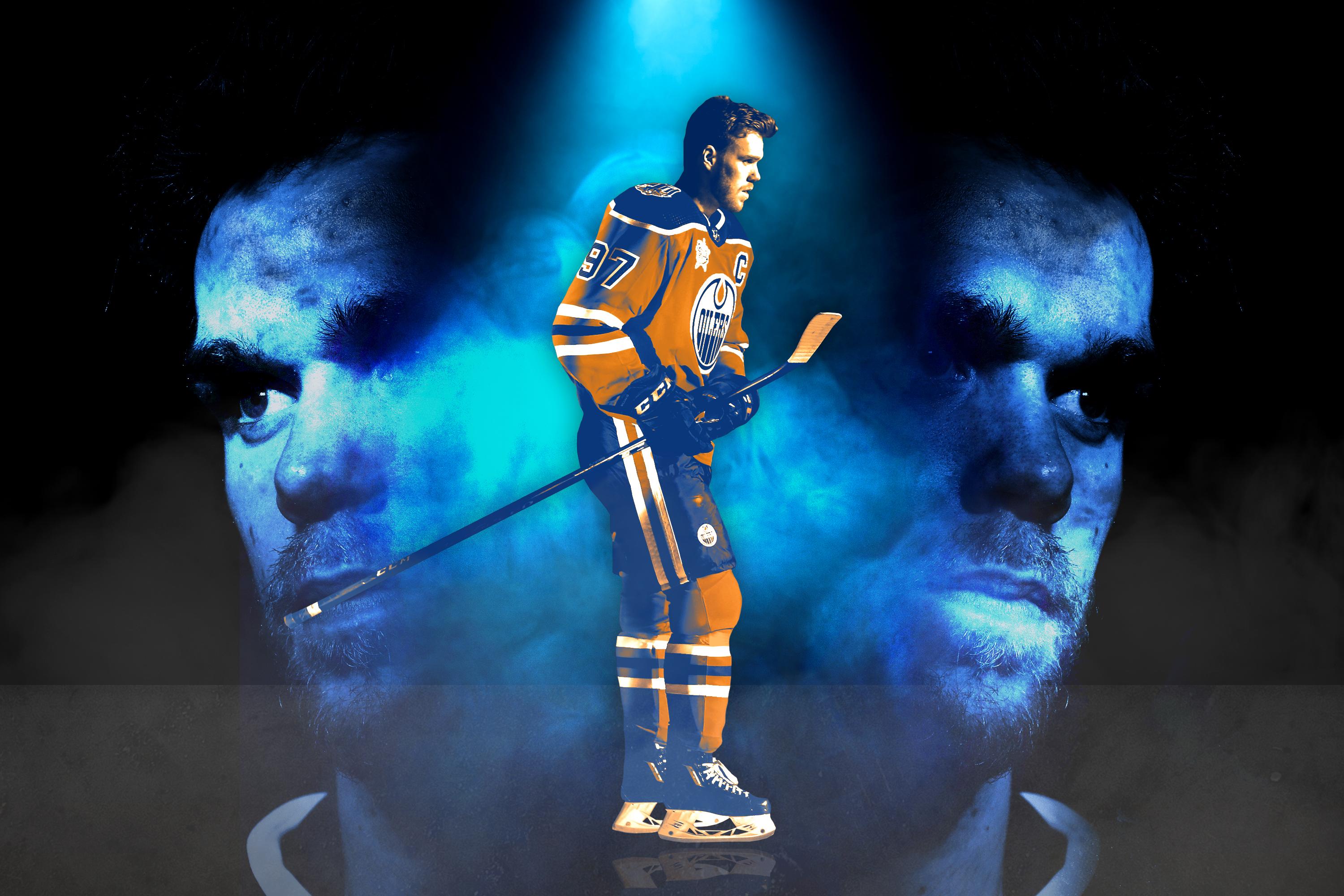
If Connor McDavid is the next face of hockey, then the next face of hockey looks exhausted. For McDavid, the just-turned-22-year-old phenom who was picked first overall by the Edmonton Oilers in 2015 and is now their team captain, this weekend’s NHL All-Star Game came at a seemingly opportune time. The Oilers have won just five of their past 17 contests. The team removed head coach Todd McLellan just 20 games into the season. And on Tuesday, the almost comically embattled general manager Peter Chiarelli was fired in between the second and third periods of a 3-2 loss against the almost-last-place Detroit Red Wings. A trip to northern California’s South Bay should have been restorative. But as McDavid sat down for a media session Thursday in San Jose, he looked anything but relaxed.
“I’m not going to comment on that here,” McDavid said when he was asked, almost immediately, about Edmonton’s disarray. “You know, we’re here for the All-Star Game and I want to enjoy that as much as I can.” Naturally, reporters responded by asking a dozen more questions on the subject. As they did, McDavid pursed his lips and itched his face. He showed up to the All-Star festivities with a new haircut, like a lost soul seeking a fresh start. But even the new look couldn’t mask the outward fatigue of being an Oiler. Finally, someone tossed him a softball question, something about the rules of the All-Star Game or whatever. “Oh my god,” McDavid said, visibly relaxing. “I was gonna get off the seat, it was so hot.”
McDavid has been the center of the hockey world’s attention for quite some time. And over the past few years, the conversation surrounding him has only grown in scope. “Brilliant, graceful, and imaginative offensive machine,” read one predraft 2015 scouting report. “Hard to convey his dominance in words; you just have to watch him play one shift.” That same year, Wayne Gretzky called him “the best player to come into the league for the last 30 years.” And in 2014, Dan Marr, the director of NHL Central Scouting, told the Montreal Gazette, “The scary part is that the best is yet to come with Connor McDavid.”
Marr was right: In McDavid’s first four NHL seasons, he is averaging more than a point per game. He scored 100 in his sophomore season, earned league MVP and top-scorer honors, and propelled the Oilers to within a game of the Western Conference final—a run that felt like a warm-up. Last season he won the Art Ross trophy—awarded to the league’s leading scorer—for the second year in a row, becoming the first player to win in back-to-back seasons since Jaromir Jagr’s four-year run from 1997 to 2001. He did all this while playing on a standard three-year entry-level contract that, in theory, benefited the Oilers in a couple of ways: First, they got McDavid’s stellar play, and second, he put up those numbers with a cheap $925,000 cap hit—a number that was just north of 1 percent of the team’s salary cap maximum those years. Those first three years with McDavid were supposed to be a launching pad for the organization. But more recently, this happy trajectory has stalled.
When the Oilers won the draft lottery in 2015, it was their fourth time being awarded the no. 1 overall pick since 2010—a grotesque luxury that the team failed to adequately leverage. (The team’s success-is-just-around-the-corner misconceptions were captured in part by a reality TV series called Oil Change that ran for four seasons yet only scratched the surface of Edmonton’s perpetual rebuild.) While Chiarelli was with the Oilers for only the most recent of those picks, he developed a reputation for mishandling the assets he inherited. Edmonton took Taylor Hall first overall in 2010, then Chiarelli traded him to the Devils for defenseman Adam Larsson straight-up in 2016; Hall won the league MVP trophy last season. Jordan Eberle, a former first-round pick with a relatively sensible contract, was moved in 2017 for what ended up—in a sort of reverse paper-clip situation—yielding Edmonton negative cap space. Before coming to the Oilers, Chiarelli had been the general manager in Boston, where he won a Stanley Cup in 2011 and was not afraid to make drastic transactions. In 2016, Chiarelli reunited with a member of that championship team in the most destructively sentimental way possible: by giving an aging Milan Lucic a monster seven-year, $42 million contract.
A ceiling can be only as high as the supporting scaffolding permits, and last season the discussion around McDavid shifted to how he was being constrained. “It’s amazing to see how Chiarelli has wasted having the best player in the game on his team,” Mike Harrington wrote in the Buffalo News last spring, referring to the numerous baffling moves Chiarelli made that had left McDavid on a shaky foundation. In November, ESPN’s Greg Wyshynski wrote that “the subtitle to [Chiarelli’s] futility is ‘squandering years of Connor McDavid’s career.’”
Two weeks ago Jonathan Willis of The Athletic took a look at two of McDavid’s recent scoring comparables—Sidney Crosby of the Penguins and Nikita Kucherov of Tampa Bay—and examined their teams’ plus-minuses with those players on and off the ice over the past two and a half seasons. While all three teams had a similar marks with their best scorers on the ice, the disparity in the results without them was stark. “Pittsburgh is plus-13,” Willis wrote. “Tampa Bay is plus-24. Edmonton is minus-53.” McDavid is starting to seem like the Anthony Davis of hockey.
There should be reason for hope in Edmonton. McDavid is right in the sweet spot of his career: Most NHL players hit their peak performance when they’re 23 or 24. He’s 22 now, still essentially a baby, only in the first season of a deal that runs through 2025. There is plenty of time, and it would be silly to panic; after all, it took Mario Lemieux seven seasons to make his first Cup final.
But McDavid’s eight-year, $100 million deal eats up about a full sixth of the Oilers’ cap space. Managing the team’s roster going forward will require a scalpel. The problem is that the people currently at the operating table seem to know how to work only a sledgehammer.
Even though Chiarelli was ousted, much of the rest of the front-office operation remains—which isn’t a thrilling prospect for the team’s top player. At Thursday’s press conference, McDavid was asked about his relationship with Keith Gretzky, who will serve as interim general manager. “My relationship with Keith Gretzky is, uh,” McDavid said, pausing and shrugging and exhaling and seeming to reach for the right, nuanced word to best encapsulate the depth and breadth of his ongoing interactions with Wayne’s brother. “It’s, it’s, it’s basic,” McDavid finally replied.
On the same day as the press conference, McDavid and another young NHL sensation, Auston Matthews of the Toronto Maple Leafs, joined commissioner Gary Bettman at Apple headquarters to speak to employees about innovation, athletics, and corporate partnerships. It was a clear sign that the league plans to push these two as its next-gen representatives. Matthews is part of a young, exciting, raw Maple Leafs core that has finally appeared to coalesce after years of organizational chaos; McDavid is still hoping to be able to say the same about his team at some/any point.
This weekend, as he’s done throughout his career, McDavid ably entertained despite the sideshows around him. At Friday’s skills competition, he topped 25 mph and won the fastest skater contest for the third year in a row. It was a thrilling glimpse into his exceptional talents, even if the following evening’s All-Star Game served as a more sobering reminder of the current state of affairs. McDavid played on Team Pacific (the game is structured as a mini three-on-three tournament, with four teams split up by division) and, facing off against Team Central in the first semifinal, McDavid’s team went down 7-1 within minutes. They lost 10-4. (Later in the game, McDavid was robbed by Central goalie Devan Dubnyk, a former disappointing Oiler who managed to turn his career around with the Minnesota Wild. That certainly had to rub a bit of salt in the wound.)
The event was won by a Metropolitan team that got five points apiece in the championship game from Mathew Barzal—whom the New York Islanders drafted with a pick obtained from the Oilers as part of a hallmark brutal Chiarelli trade—and Crosby, who after all these years remains an inescapable representative of the sport and the league, the way many hope McDavid will be.
McDavid’s All-Star weekend petered out early, before we’d even really gotten to see him properly showcased. And two of his first three seasons have gone the same way. There have got to be brighter days ahead, and maybe they’ll be here soon enough to make all this fretting seem absurd. (McDavid pointed out Thursday that the Oilers are still only three points out of a playoff spot.) But that mentality has existed in Edmonton for a decade now with little to show for it. When you’re always walking toward the locker room with your head down, it’s hard to become the next face of hockey.

